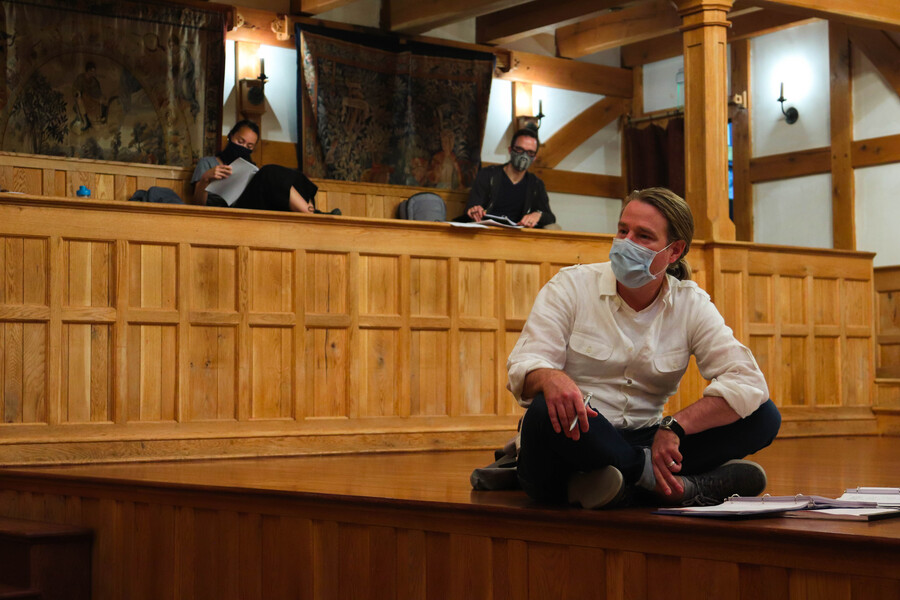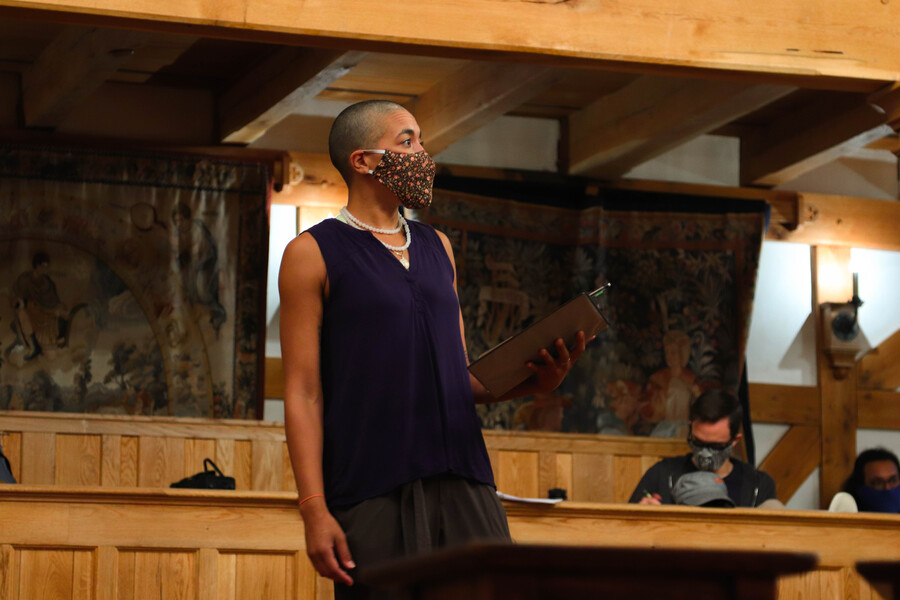When Actors’ Equity Association announced in late May its four guiding principles for reopening theatres, developed with the advice of former OSHA head Dr. David Michaels, it felt like live theatre was still worlds—or at least many, many months—away. With requirements like the pandemic needing to be under control in a given theatre’s region, and extensive (and accurate and speedy) testing available, bars that few areas could reasonably say they were meeting, theatres all over the U.S. have begun to push seasons back as far as the spring and summer of 2021. And that was even before the surge of cases the nation has seen over the last month, as cities have prematurely reopened and many people have ignored safety measures.
For better or worse (in many cases worse), some theatres across the country have decided to press on anyway, implementing their own safety plans and measures to convince artists and audiences to return. With Equity approval seeming unattainable, at least for the near future, some theatres, like American Shakespeare Center in Staunton, Va., have decided to simply move forward with just their company’s non-Equity productions, forgoing the Equity contracts they have also typically used (ASC has long had both an Equity and a non-Equity company). Their repertory of Othello and Twelfth Night begins July 25.
But it turns out that Equity’s imprimatur isn’t entirely out of reach. On July 6, Equity approved productions at two theatres in Pittsfield, Ma., Barrington Stage Company and Berkshire Theatre Group (BTG), which begin performances Aug. 5 and 6, respectively. What is the difference among these productions and these two towns? Why has Equity given the go-ahead to two companies but not the other one?

“The first manual that I submitted to Equity was rejected,” said Kate Maguire, artistic director and CEO of BTG. What followed for her was an intensive series of conversations with Equity in which she made her case for BTG’s unique situation. Berkshire County is isolated, Maguire explained to me, with no trains coming into the city of Pittsfield or its neighboring town of Stockbridge, where BTG’s theatres are located. The nearest major airport is 35 miles away in Albany, N.Y. “It’s a place where people come in the summertime,” Maguire concluded, “but it’s not that easy to get to.”
Additionally, Maguire and BTG have closely followed data trends, and they spoke with local hospital officials about the area’s falling number of local COVID-19 cases. Pittsfield, where Godspell will be performed outdoors in a tent, is currently reporting just 187 confirmed cases (33 of those are active, while 148 are listed as recovered) and 6 deaths. Maguire stayed in conversation with Equity, making BTG’s case to be able to produce this summer, and in turn Equity asked BTG to work more closely with them on a resubmitted safety manual. What followed, Maguire said, was “one of the great learning experiences of my life.”
“We spoke every day, late into the night, about every single piece of the production,” Maguire recounted. “And as I was talking about the actors, I also recognized, this is the way I’m going to keep our staff safe, and this is the way I’m going to keep our audience safe too. It was all-encompassing in a way.”
Early on in the process, Maguire realized that, even for an outdoor production, putting everything in place to proceed was going to be “extremely complicated.” So much so that Maguire had to reevaluate the planned Labor Day weekend production of a multi-composer song cycle, Letters to the President, conceived by Michael Bello and Jessica Kahkoska. The decision was made to cancel Letters so that Maguire could focus on the complexities of mounting Godspell and ensure compliance with Equity’s requirements.
“I kept saying, I am going to say yes until I have to say no,” Maguire said of the process, in which she chose to err heavily on the side of caution. “I remember thinking, if we’re told no, we should be told no. We always talk about the theatre like it’s our family, while in my heart of hearts, I think of my three children as my real family. But these people who come in August, they’ve all of a sudden become my family. Some days I was talking to [Equity] at 10 o’clock at night, going through things, and the responsibility just felt very much like taking care of one’s child and keeping them healthy. I can’t compare it to anything else.”
The final safety manual stood at a thoroughgoing 30 pages, which, Maguire emphasized, is applies only to this particular production of Godspell. If BTG were to turn its attention to another production, or production indoors, or a production at their Stockbridge location, Maguire said, they’d have to look at creating an entirely different manual. In addition to the implementation of masks, distancing, and actors being tested three times per week, according to Maguire, BTG was in correspondence with Godspell composer and lyricist Stephen Schwartz. With half of BTG’s manual dedicated to staging guidelines and restrictions, director Alan Filderman and choreographer Gerry McIntyre had to make some significant adjustments to how the production is put onstage.
“There’s no touching, there’s no choreography where they dance with and touch each other, they all have to be six feet apart from each other,” McIntyre explained, noting that the production will also utilize partitions separating pairs of actors as well as masks at points. “So it’s completely the opposite of what you would normally expect a production of Godspell to be, where this group of people come together and they paint things on each other and they hug each other and they’re telling their stories by playing around with each other. We’re not doing any of that.”

On top of those constraints, Filderman and McIntyre are striving to drastically limit the number of actors who will be singing at the same time, as the Center for Disease Control (CDC) has noted that the spread of COVID-19 is greatly amplified by the act of singing. Aside from the first and last song, the BTG team explained to me in a call, no more than half of the 10-person cast will be singing at the same time. Still, they believe that while the way the story is being told may be different, the reception of Godspell’s message will remain the same.
For his part, Nicholas Edwards, who will be playing Jesus in this summer’s production, admitted he’s a bit nervous, knowing that BTG is a test case of sorts in the midst of a pandemic. But most of his concerns, he said, were allayed when he saw the plan that Equity and BTG put together. “Once I read the guidelines and the manual,” Edwards said, “I knew that they were really going for our best. Our safety and our health was their No. 1 priority.”
There’s pressure on this production, as the first out of the gate (alongside Barrington, which is staging solo productions outdoors) with a blessing from the actors’ union. McIntyre, Filderman, and Edwards all acknowledge the pressure but choose to downplay that to focus on what’s exciting about this opportunity to finally get back to work and back onstage.
“I’m really looking forward to that first night,” McIntyre said. “People have been so starved for live theatre. I can’t wait to hear the first laugh, the first applause. That’s the part that, in the end, is going to be so worth it.”

Meanwhile in Virginia, American Shakespeare Center (ASC) and artistic director Ethan McSweeny made the decision to press forward with repertory productions of Othello and Twelfth Night. While they have usually run two companies, one of which is always non-Equity while the other is partly Equity-affiliated, this summer ASC is moving forward with only its non-Equity company. It’s a decision that is being made by a number of theatres and dinner theatres around the country—and Equity has taken notice, listing these defectors on their Safety Spotlight.
Still, ASC insists, they are striving to ensure the safety of both artists and audiences with a 23-page SafeStart Plan, with advice from Staunton city officials, community leaders, and an infectious disease specialist for a local hospital, Augusta Health.
“It turns out that sourcing everything locally is a really smart part of this,” said McSweeny. “Having a local healthcare provider that is not some national chain, but is actually based here in Augusta County, makes a really big difference.” McSweeny pointed out that, like the Berkshires, the valley in which Staunton (pop.: 25,000) resides has not had a significant outbreak. August Health reports just 318 COVID-19 cases for Augusta County, which surrounds the independent city of Staunton, since April 1. What’s more, McSweeny continued, rural Staunton has benefited from how seriously the state of Virginia has taken the pandemic. “We’re behaving like we’re in an urban environment, but we’re actually in this relatively safe rural environment,” McSweeny said.
The specifics of ASC’s bare-bones operation are another point in their favor, according to McSweeny. As opposed to some large-scale Shakespeare productions that might be mounted elsewhere, ASC regularly performs without sets, lights, or sound design, instead using universal lighting and using the ensemble to create live sound. There is little in the way of backstage crew. Not only do these minimal technical components reduce the number of people working on the production (thus keeping the number of people in any given room down), it has also allowed ASC to be nimble with their rehearsal schedule. This flexibility was key for ASC, which received a Payroll Protection Plan loan but needed more to stay afloat.
“If we weren’t able to create content,” McSweeny said, “then that lovely loan was going to pass through us. It would keep people employed for another month, month and a half, but it wasn’t going to help them beyond that. So if we wanted to continue as a theatre, and if we wanted to employ our artists, and if we wanted to be part of some kind of economic resuscitation of this community, where our theatre is a primary economic driver, then we needed to figure out how we could produce.”
Despite a successful launch of BlkFrsTV, a platform which housed recordings of seven ASC productions filmed before the shutdown and which grossed the company a little over $115,000, according to McSweeny, the company needs to find other ways to generate revenue, 75 to 80 percent of which comes from the box office. “When you turn off the box office, that’s it,” McSweeny said. “We didn’t have a savings account. We didn’t have a rainy day fund. We had a little bit of liquidity and that was about all we had.”

Bottom: Seats arranged in the Blackfriars Playhouse for the socially-distant Summer 2020 SafeStart Season. (Photo by Dan Hasse)
The money from BlkFrsTV, while nice, was “not two weeks worth of what we would have made if we had two companies playing.” Without the ability to produce, McSweeny was looking at his $4.5 million-a-year company having to reduce to a third of its size. With the PPP loan in hand and a decision to return to production, ASC planned to start rehearsal on May 26. Around May 20, they submitted their plans to Equity—which, according to McSweeny, took until May 29 to “firmly reject” all of them. By that time rehearsals had been pushed back to June 2, then back again to June 9.
As the introduction to ASC’s SafeStart document points out, Dr. Allison Baroco, a specialist with Augusta Health, said she conducted an “extensive” walk-through of the theatre, and—given her knowledge of infectious disease, the theatre, and the region’s COVID-19 response—gave her blessing to ASC’s SafeStart Plan. The plan is broken down into guidance and protocols for the administrative offices, backstage area, performance group, production group (including designers and directors), and front of house. The detailed document points to the expected measures of thorough and regular cleaning, socially distanced seating, mask requirements, no concessions, and operating at less than 50 percent capacity, while also providing color-coded maps restricting who is allowed to be in certain areas of their space (such as limiting certain areas of backstage to only the performance group) and guidance on how to check for symptoms of the coronavirus.
“We started working on that plan and worked really hard to see if we could get Equity to embrace it,” McSweeny said. “They were not ready to do that, and honestly they weren’t really interested in any collaboration. They were pretty dismissive of our efforts. In the end, that put us in a position where we have no choice but to cancel the [part of the] season that would have involved Equity.”
When asked about the difference between the productions the union approved and those they didn’t, Equity communications director Brandon Lorenz said that the back and forth of the BTG conversations was a “fairly typical example of the ongoing engagement we’ve been having with producers.” By contrast, he said that after Equity sent back comments on ASC’s safety plan, they “informed us…that they were going forward with a non-union production.”
Added Lorenz, “We understand that everyone wants to get back to work and that people involved in theatre are involved in theatre because they love it. But at the same time, the workplace needs to be safe.”
McSweeny was quick to say that he has “no beef with Equity. They forbade their members from working at the Blackfriars, so ASC canceled [that part of] the season. As far as I’m concerned, that’s the end of the story. We’re producing our non-union company; we’ve done that for 30 years. They’ve never had a role in that. It did mean that some of their members—who were, frankly, dear friends of mine—weren’t able to work here.”
Jessika D. Williams, who will be playing Othello in Othello and Antonio in Twelfth Night, has worked with ASC for six seasons, playing more than 30 roles for the company. Williams said she made the difficult decision to resign her Equity membership after 10 years so she could be part of these productions. Williams noted that she’s always been a supporter of unions, but doesn’t feel that Equity truly considered ASC’s SafeStart plan.

“We don’t want to make the public sick,” Williams said, mentioning that Augusta Health has been available throughout to answer the company’s questions. “We don’t want to make ourselves sick. We’re doing the best we can. If at any point it becomes unsafe, we won’t push through, because that is the responsible thing to do. I believe that everyone has signed on knowing that that is the case.”
Williams said she felt supported, not pressured, by ASC to continue with the show, and that she believes in the theatre. Equity’s position, she said, made her feel pitted against the theatre, so she made the decision she felt was best for her. “It’s just, in this particular situation I felt like I wanted my own autonomy and my solidarity with my company and my health and my family and my situation,” Williams said.
Michael Manocchio, who will be playing Malvolio in Twelfth Night and Duke in Othello, conceded that he might not have made the decision to proceed with performing for a company he hadn’t worked with several times, or didn’t know and trust intimately, as he has and does ASC. Manocchio is also serving as an ASC SafeStart deputy, representing the performance group (which includes actors and stage managers) and meeting regularly with administration to be a voice in the room for performers as ASC’s SafeStart plan continues to evolve.
“So much of why we’re able to do what we’re doing here is because of who we are and where we are,” said Manocchio. Voicing empathy for the union’s position, he said, “I can’t imagine what it’s like trying to figure out protocols on a national scale. I’m very aware that it is the specifics of who we are, where we are, and how we do things that’s allowing us to do this.”
McSweeny, who said his company has been moving at “hyperspeed” just to survive the pandemic, thinks his company won’t be alone in trying to find ways to reopen safely, with or without union blessing.
“The smaller theatres are going to have to be the ones that lead the way first,” McSweeny said. “Smaller theatres in those rural environments—we have an opportunity, and I think even an obligation, to be the places to try and model approaches that will make it possible. Because I don’t think it’s really feasible for us all to just try and hold our breath and hope that we can come back when this is all over.”


